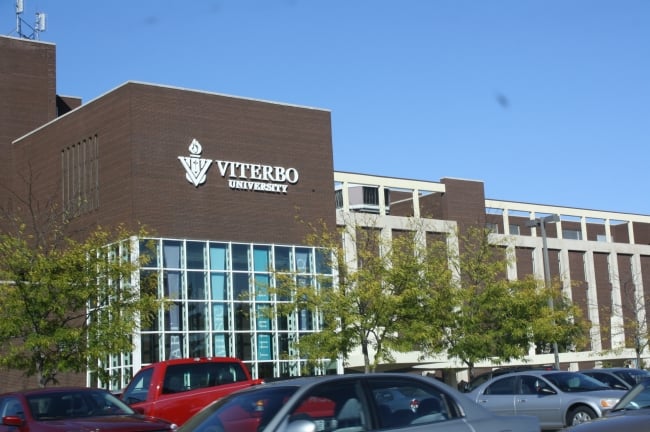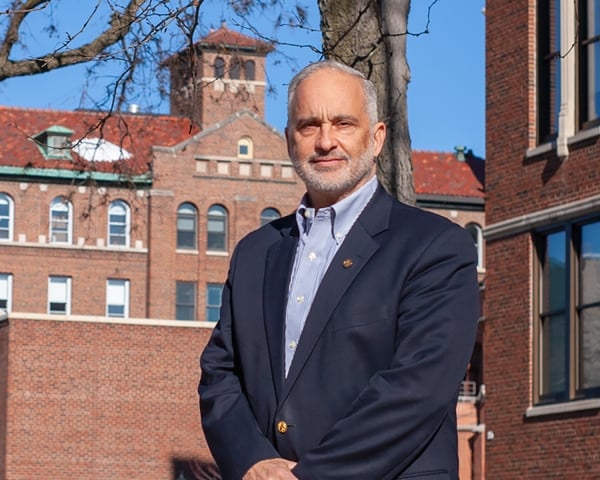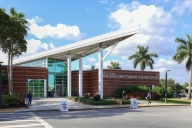You have /5 articles left.
Sign up for a free account or log in.

Viterbo University will soon operate a higher education consulting firm.
Royalbroil, CC BY-SA 3.0/Wikimedia Commons
Like many small, religious colleges, Viterbo University in La Crosse, Wisconsin is facing financial challenges. Richard Trietley, president of the Catholic university, recently informed faculty and staff that the university is eliminating 13 filled and 14 unspecified vacant positions next month and freezing hiring for two others amid a $5.5 million budget deficit, The Winona Daily News reported.
In addition to enrollment declines—average student enrollment dropped from 2,551 in 2019 to 2,226 this year—Trietley said the shortfall was driven by lower student retention, reduced revenue from student fees, higher tuition discounts and increased costs of providing student services.
But an unusual donation will soon open a new revenue stream for Viterbo, and potentially distinguish the university in a competitive enrollment environment that has led to the closure of numerous Catholic colleges in recent years, including Notre Dame College in Ohio this spring and the College of Saint Rose in New York last fall.
Two days before Viterbo’s impending layoffs made headlines, the university shared a more positive piece of news: Frank Casagrande, founder and president of a long-running higher education consulting firm, Casagrande Consulting, is donating his business (valued at $1 million) to Viterbo.
Starting July 1, it will be known as the Casagrande Institute for Higher Education Effectiveness and will be overseen by the college’s Center for Professional Learning (CPL).
“We feel like we can be a partner to other institutions, and hopefully leverage higher ed as a whole through this work,” said Nicole Van Ert, director of the CPL, which is under the purview of Viterbo’s business school. “Helping our colleagues at other institutions become more effective and build on our experience will hopefully help us all become more successful.”
As part of Viterbo, the Casagrande Institute will also create more opportunities for students interested in learning about business and the nonprofit sector. The CPL, which is part of Vertibo’s broader enrollment strategy, has helped widen the pool of potential students by offering nondegree credentials and other customized educational programs for businesses interested in upskilling their workforces.
Since Casagrande Consulting launched in 2009, it has worked with more than 100 mostly small, private institutions, offering assessment and analyses of compensation, board and leadership effectiveness.
Viterbo consulted with Casagrande to develop an employee compensation model in 2022.
“We were quite a bit off the benchmark of where we needed to be with our faculty salaries,” said Tonya Wagner, vice president for academic affairs and institutional effectiveness. “We needed a structured external methodology that could validate our decision-making, and bolster it so that there was trust in the process about how we were determining what was fair, equitable and just compensation.”
Casagrande’s approach to compensation involves aligning institutional missions and budgets, which Viterbo intends to carry forward.
“Frank has a deep level of emotional intelligence in navigating complex issues with faculty,” Wagner said. “He brings a lot of data credibility along with his keen sense of working with people, how to communicate appropriately with stakeholders and how to create buy-in.”

Frank Casagrande
Viterbo University
Last spring, Casagrande approached Wagner about gifting his consulting firm to Viterbo as he approaches retirement.
“This is a way of gifting in perpetuity,” said Casagrande, a practicing Catholic and first-generation college graduate who said the donation is his way of giving back to higher education. While the gift doesn’t specify how the university should spend the extra revenue, Casagrande said his expectation is that it will go toward furthering the university’s mission of expanding opportunities for underserved students.
“We will be measuring margins in terms of scholarships not dollars,” he said.
Once the new institute opens, Casagrande, a trained actuary, will serve as an executive in residence until a permanent director is named, though it’s not clear when that will happen.
With expansion of the CPL already part of the university’s strategic plan, Wagner said the deal seemed like a win-win.
In addition to the revenue boost the Casagrande Institute is expected to bring for Viterbo and the guidance it will offer to peer institutions, the new institute will also draw on the expertise of Viterbo faculty and offer experiential learning opportunities, such as an internship or certificate program for students.
“When you have PhD faculty who are helping with the delivering of these services, who also teach in the classroom, it adds credibility and respect that we’re valuing what faculty do,” said Wagner, who envisions faculty in fields such as business, psychology and education helping with consulting. “We are bringing in a business, but we’re really integrating it into our academic offerings that we’re offering to students, and we’re also integrating it into our existing structures and using the support we already have in our faculty and staff.”
‘Plenty of Universities in Need’
Reverend Dennis Holtschneider, president of the Association of Catholic Colleges and Universities and former president of DePaul University, said in an email that he and leaders at many other institutions have benefitted from Casagrande’s consulting services over the years.
“Viterbo’s challenge will be that of all organizations having a charismatic industry-leading founder. They must scramble to resecure their prominence,” he said. “That done, there’s no question but that there are plenty of universities in need of their services to remain or become customers.”
Carrie Richards, associate director of the Bayer Center for Nonprofit Management at Robert Morris University in Pennsylvania, said that involving Viterbo students in the operation of the Casagrande Institute may add to the institute’s viability. That’s something the Bayer Center, a nonprofit consulting firm that opened at RMU in 1999 didn’t prioritize; last year the center was deemed no longer self-sustaining and its consultant services are now delivered by volunteers from the Executive Service Corps.
“Having the opportunity to work with nonprofit organizations as an engaged learning tool is going to be very important to some community-minded individuals when they’re looking for colleges. And to be able to gain revenue through consulting at the same time is a great model,” Richards said. “It’s just a matter of if there is enough work to sustain the salaries of consultants.”
Doug White, a philanthropic adviser and longtime consultant for higher education institutions and other nonprofits, said that from what he can tell, Casagrande’s donation is promising.
In addition to attracting students with the opportunity to do real-world consulting, White said if Viterbo can offer other Catholic colleges a strategy for weathering an era of financial headwinds at an affordable cost, “it could be very favorable to these organizations.”




